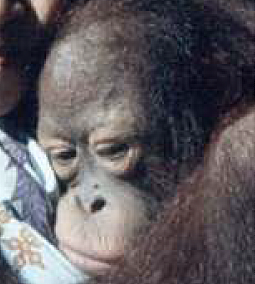by Gary L. Shapiro, PhD.
In my book, Out of the Cage, I recount a lifetime of experiences with orangutans—experiences that have shaped my understanding of their intelligence, emotions, and capacity for suffering. One story, in particular, stands out as a poignant example of the emotional depth and vulnerability of these remarkable creatures: the story of Jimmy.

Jimmy’s tragic death highlights why the push for orangutan personhood is not just an academic discussion—it is a moral imperative. The notion of legal personhood for non-human species has gained traction in recent years, particularly for great apes, whose cognitive abilities and emotional lives closely mirror our own. Jimmy’s story not only underscores the urgency of this cause but also illustrates the devastating consequences of failing to recognize orangutans as sentient beings with individual rights.
The Story of Jimmy: A Bond Broken by Law
Jimmy’s journey began in heartbreaking circumstances. Like so many other orangutans, his mother was killed, and he was thrust into the illegal pet trade in Indonesia. Eventually, Jimmy found himself in the care of an elderly Indonesian woman, who took him in as her surrogate son. Their bond was profound, rooted in mutual love and dependence. However, under Indonesian law, keeping orangutans as pets is illegal, and Jimmy was eventually turned over to Camp Leakey for rehabilitation in 1979.
When Jimmy’s human mother brought him to Camp Leakey, it was clear that the separation was devastating for both of them. Jimmy, around six years old at the time, had come to rely on this woman for emotional comfort and sustenance. She had replaced the mother he had lost, and their relationship went beyond mere caretaking—it was one of deep emotional connection. As she tearfully walked away from him at Camp Leakey, Jimmy's world shattered.
From that moment on, Jimmy’s health declined. He stopped eating on his own, and despite our efforts to rehabilitate him, he became severely depressed. We monitored his health, checked for physical ailments, and gave him vitamin shots to restore his energy. While there were brief moments of hope when he began to improve, his emotional trauma was too deep.
The final blow came when Jimmy’s adopted mother returned for a brief visit in July 1979. Seeing her again reignited the bond they had shared, but when she left once more, Jimmy’s fragile emotional state collapsed. In the following weeks, Jimmy refused to eat, wasting away despite our desperate attempts to keep him alive. On September 2, 1979, Jimmy died in my arms. He had lost the will to live, broken by the separation from the one individual he had trusted and loved.
What Jimmy’s Story Teaches Us About Personhood
Jimmy’s story is a devastating example of how orangutans experience deep emotional bonds, grief, and loss—traits that many of us associate only with humans. His death was not the result of illness or injury but of profound emotional suffering. He missed his adopted mother so deeply that it led to his physical decline and eventual death. This emotional complexity is one of the key reasons why orangutans should be recognized as persons, not property.
Granting legal personhood to orangutans would acknowledge their right to live without the emotional trauma caused by forced separations and captivity. It would recognize that orangutans, like Jimmy, have feelings and psychological needs that must be considered. In many ways, Jimmy’s story parallels the experiences of human children who are separated from their caregivers—it is a narrative of emotional devastation and the struggle to survive without love and connection.
Legal and Ethical Implications
The current legal framework treats orangutans as property, subject to human ownership and control. This not only leads to physical harm but also fails to account for the emotional and psychological well-being of these highly intelligent creatures. Recognizing orangutans as legal persons would mean granting them fundamental rights, such as the right to not be held captive, exploited, or subjected to trauma like Jimmy experienced.
The tragic irony of Jimmy’s situation is that the law intended to protect him ultimately contributed to his demise. While the ban on orangutan ownership is necessary to prevent the exploitation of these animals, it also reveals the inadequacies of a system that views orangutans only in terms of legality and not in terms of their emotional needs. A personhood framework could offer a more compassionate and just approach, where the emotional bonds between orangutans and their caregivers are acknowledged, and where their well-being is prioritized.
A Call to Action: Advocating for Orangutan Personhood
Jimmy’s death was not an isolated incident. It reflects a broader problem in how we treat orangutans and other great apes. They are sentient beings with complex emotions, capable of forming deep bonds, experiencing grief, and even losing hope. Recognizing their personhood would ensure that their rights are protected, their suffering minimized, and their dignity upheld.
In Out of the Cage, I explore the intelligence, emotional depth, and individuality of orangutans like Jimmy. Their ability to experience love, loss, and depression should compel us to rethink how we view their legal status. Granting orangutans personhood would not only protect them from physical harm but also honor their emotional lives, preventing future tragedies like the one that took Jimmy from us.
We owe it to Jimmy—and to all the other orangutans who have suffered in silence—to advocate for their legal recognition as persons. By doing so, we can create a future where orangutans are no longer treated as mere property, but as beings with inherent rights, deserving of compassion, respect, and protection.
